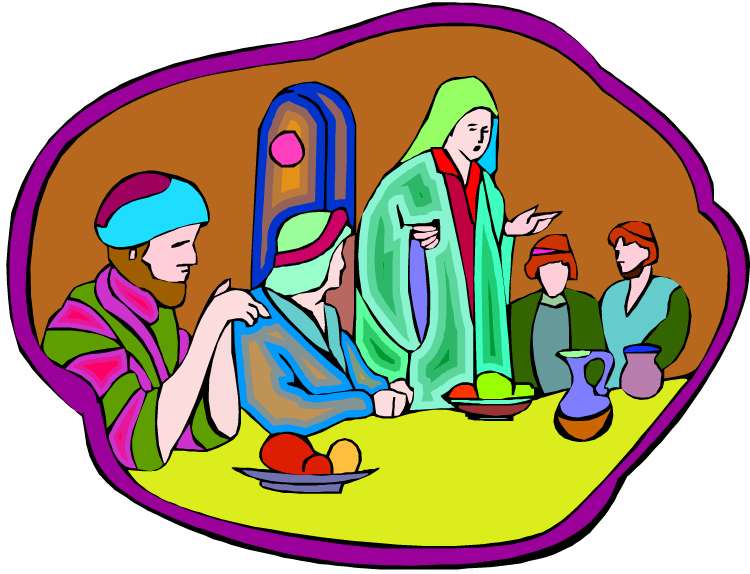
Yeshua the Messiah was not your typical dinner guest. In fact, by today’s standards, he would have been considered impertinent, impolite, politically incorrect if not downright rude in how he treated his hosts. But since Yeshua was sinless in all that he did and totally led by the Spirit of Elohim, his behavior, as unconventional as it may seem, cannot be faulted. Why is this? This is because Yeshua always had one goal in mind: to advance the kingdom of his Father, to spread the light of Truth in the darkness of human delusion, lies and false concepts—to be spiritual salt and light wherever he went. Yeshua was always loaded for bear, so to speak. Luke chapter 14 is a perfect example of this.
Luke 14
Luke 14:1, House of one of the rulers. Yeshua was invited to a Sabbath meal at the home of a Pharisee who was a ruler (likely a wealthy member of the Sanhedrin). Had Yeshua been a typical man, he would have engaged in the customary small talk of a polite and gracious dinner guest not wanting to offend his host. Yet Yeshua was not there to schmooze—to curry anyone’s favor in an effort to gain personal influence. As he required his own disciples to maintain a salty or spicy demeanor at all times (Matt 5:13; Luke 14:34–35), he was definitely up to the task to lead his disciples by example. The following discussion that Yeshua initiates is what some may consider to be a prime example of how to insult one’s host and the other guests.

First, Yeshua confronts a controversial issue head on by asking a question, and then by healing one of the other invited guests on the Sabbath, which was a Pharisaical taboo, though not contrary to the Scriptures (Luke 14:2–6).
Next, Yeshua takes some of the guests to task who were prideful social elites and religious status-seekers. He challenges them to humbles themselves and let Elohim exalt them in the eyes of men (Luke 14:7–14).
Yeshua then raises the discussion around the table to a higher level when he tells the Parable of the Great Supper (Luke 14:15–24). Doubtless, a few of the guests were made to feel awkward, since they likely resembled some of the characters in Yeshua’s story.
At this dinner table, there was no small talk of sports, the weather, one’s job or other tidbits of gossip. On the contrary, Yeshua was showing his disciples, and us, how to be salt and light wherever we go, even at the risk of offending one’s hosts, and all for the greater good of expanding the kingdom of Elohim in the lives of men.
Of course, it should go without saying that in being salt and light, one has to be totally led by the Spirit of Elohim or else more harm than good will be done.
Luke 14:18–24, Make excuses. This passage is a continuation of Yeshua’s previous discussion and must be seen in that context. Buying a piece of property and a yoke of oxen and getting married is equivalent today to buy a new home, a new car and getting married. These are among the three most notable, expensive and life-changing events to happen in a person’s life. In the eyes of a secular-minded man, to put one’s religion ahead of these things seems weirdly strange. Such a person will likely be viewed as a religious fanatic, extremist, a Bible thumper or Jesus freak. Yet such a reordering of priorities in one’s life is required of a person who desires to enter YHVH’s everlasting kingdom (Luke 14:15). The path to this lofty goal is narrow and sadly few will choose it.
Luke 14:26–33, If any man comes to me. This discourse is also a continuation of Yeshua’s previous thoughts, both of which were part of a larger discussion relating to the kingdom of Elohim that Yeshua initiated while at the dinner party of a rich Pharisee who was a ruler (likely a member or the Sanhedrin, Luke 14:1). In this part of the discussion, Yeshua continues the line of thought on what is required to enter the kingdom of Elohim. First, one must count the costs to enter the kingdom, which in the world’s eyes is high. Next Yeshua sets himself squarely in the position of being the door to entering the kingdom, and then demonstrates in the most graphic terms that one must love him above all else including close family members and even one’s own life if he wants to be part of YHVH’s kingdom. Such a man, for certain, would be viewed by his secular contemporaries as a religious fanatic! Yet this is what Yeshua requires of his disciple (Luke 14:33).
Luke 14:26, Hate his father and mother. Some people will quote this verse out of context thus turning Yeshua into a cruel, hateful and demanding tyrant. The key to understanding this clause is to read the rest of the sentence, which ends with the word, “yes, and his own life also.”
Unless they are psychotic, no one hates their own life. In fact, the Torah enjoins us “to love our neighbor as ourself,” which is part of the shema (Lev 19:18), and which is a partial summation of the entire Torah.
Even though the Greek word for hate is miseo meaning “to hate or detest,” Yeshua is using hyperbole here to make the greater point that to be his disciple, one must love him more than anything else. The world calls this fanaticism, but the world’s evaluations are based on hypocrisy. No one questions the almost worshipful fanaticism of a sports fan (short for fanatic) or a rock star groupie! This is socially acceptable. Thousands will fill vast arenas and stadiums adoringly hooting and hollering over their favorite team or rock music star, but when it comes to getting excited about Yeshua, well, that’s fanaticism.
What Yeshua hyperbolically is telling us in this verse is that we must love him more than anyone or anything including our closest family members…and even our own life. We must follow his example in that he laid down his life for us, and so we must be willing to do the same for him. The bottom line is that serving Yeshua must be the highest priority in our life!
Luke 14:34–35, Salt is good. Yeshua then ends his discussion with a pithy analogy involving salt. What is the hidden message in this? Elsewhere, Yeshua states that his disciples are to be salt and light in this world (Matt 5:13–14). In this passage, Yeshua implies the same thing and concludes that salt that has lost its saltiness is useless.
Salt is a necessary ingredient to the body’s survival. It also helps to enhance the flavor of the food it seasons, and it stand out if too much is added. Salt also acts as a food preservative in that it prevents spoilage by killing pathogens.
Yet Yeshua warns against salt losing its saltiness. How is this possible? This occurs through dilution. If Yeshua’s disciples are to be like spiritual salt to the world, then they can lose the quality as a seasoning, life preservative, killer of spiritual pathogens. This will occur if they allow their priorities and spiritual focus to become watered down, and if the cares of this life take precedence over the service and obedience to Yeshua as he outlines in the previous verses. This is a how a disciple of Yeshua loses his saltiness and becomes useless to the kingdom of Elohim.


How could you not love Him (Yeshua)?
John
He was the real host here for He was feeding them! Truth!
Great point, which I hadn’t thought of before.